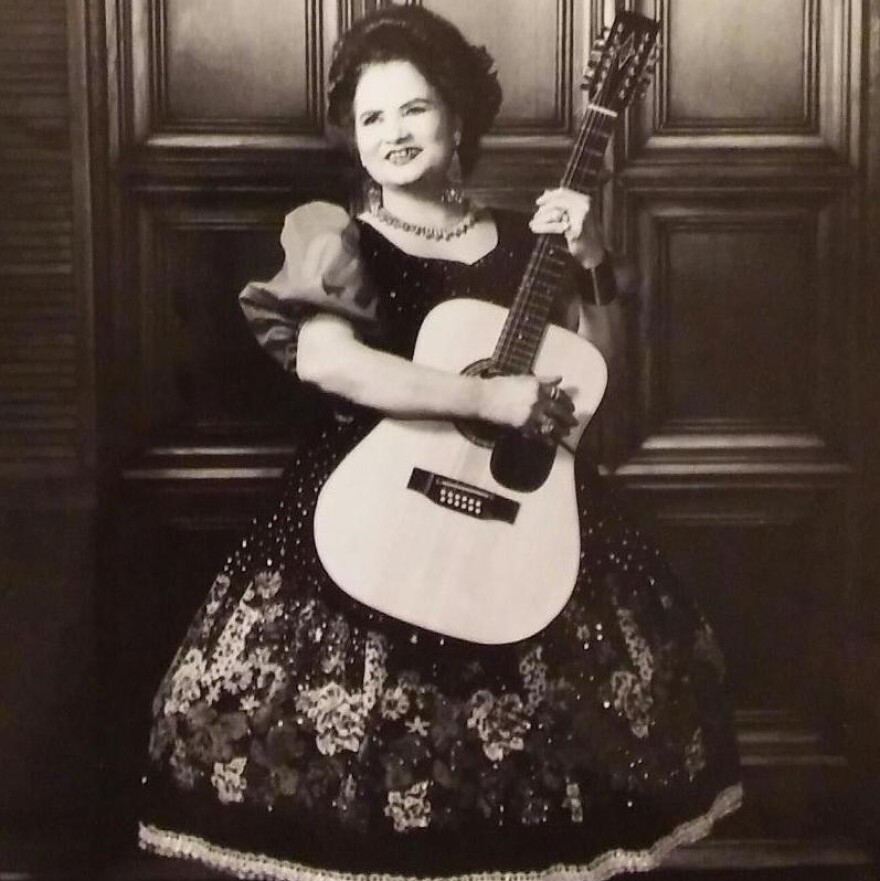Lydia Mendoza, known as “La Alondra de la Fronteras (The Lark of the Border),” would have turned 103 on May 31. She was honored the day after her birthday with a historical marker at her gravesite at San Fernando Catholic Cemetery No. 2 in San Antonio.
Her powerful voice and unconventionally tuned 12-string guitar struck a chord with her audience, whether she was singing in the fields, or in plazas, or performing on the radio.
Hector Saldaña, curator of the Texas Music Collection at the Wittliff Collections at Texas State University in San Marcos, called her a pioneer.

“I think if you look at her with her 12-string guitar, she’s really closer to the blues of, say, Lead Belly or Robert Johnson,” Saldaña said. “She’s singing about everyday life, and she’s doing it on her own.”
Saldaña said Mendoza presented a view of Mexican-American life that wasn’t festive. “Her songs were heartbreaking, intense, emotional. I always go back to something that Flaco Jimenez told me when he heard her as a little boy. It was like listening to the stars fall out of the sky,” he said.
Mendoza’s first hit was 1934’s "Mal Hombre." As Saldaña said, it’s intense. Emotional.
Her musical artistry was lost, though, on her grandchildren. To them, she was just Grandma — Grandma who sang and sometimes had gigs.

Granddaughter Jessica Davila said her birthday parties were always fun.
“It was always ‘otra canción, otra canción (another song, another song).’ Everybody just loved her. But to us she was our mamá," Davila said.
Mendoza’s grandson, Roland Hernandez, would look forward to her breakfasts and dinners.
“She took care of us like any grandmother would,” he said.
Hernandez and the other grandkids took her gigs for granted when they were young.
He said he thought, “Oh, Grandma’s performing tonight. Oh, ok let’s go see her.” Hernandez said it took time before he realized, “Wow, she really is somebody (other) than just grandma.”
Beatriz Llamas, 80, is known as “La Paloma del Norte.” She’s one of the last two surviving members of Las Tesoros de San Antonio, a quartet of San Antonio singers whose careers spanned decades. She came to the cemetery to pay respect to her mentor, Lydia Mendoza.

Llamas remembers Mendoza would always put a couple of beers on a suitcase and down them before she started to sing. “Aunque eran calientes, no le hace (even if they were warm, it didn’t matter),” she said. “Pero cantaba con esa armonía, ese gusto, ese amor. La guitarra la hacía hablar (She sang with emotion, such love. She made the guitar speak).”
Mendoza was honored with several awards throughout her long career.
President Bill Clinton honored “La Alondra” in 1999 with the National Medal of Arts. She has been inducted in the Texas Women’s Hall of Fame, and the Tejano Music and Conjunto Music Halls of Fame. Mendoza was honored with a Forever Stamp 2013.
Rudy Gutierrez applied for Mendoza’s historical marker in 2015. Gutierrez’s late father, composer and record producer Salomé Gutierrez, was friends with Mendoza for 60 years. Gutierrez said the marker honors the musical legacy of a woman who continues to pay it forward.
“Before there was a Selena and a Laura Canales, she (was) the first superstar of Tex-Mex music, Tejano music. She paved the career for all women who came after her in Spanish language music. And for that, we honor her,” Gutierrez said.
La Alondra still sings.
See Lydia Hernandez sing "Amor de Madre," recorded live in San Antonio, 1975.
Norma Martinez can be reached by email at norma@tpr.org and on Twitter @NormDog1. Lauren Terrazas can be reached by email at lauren@tpr.org and on Twitter @terrazas_lauren.













